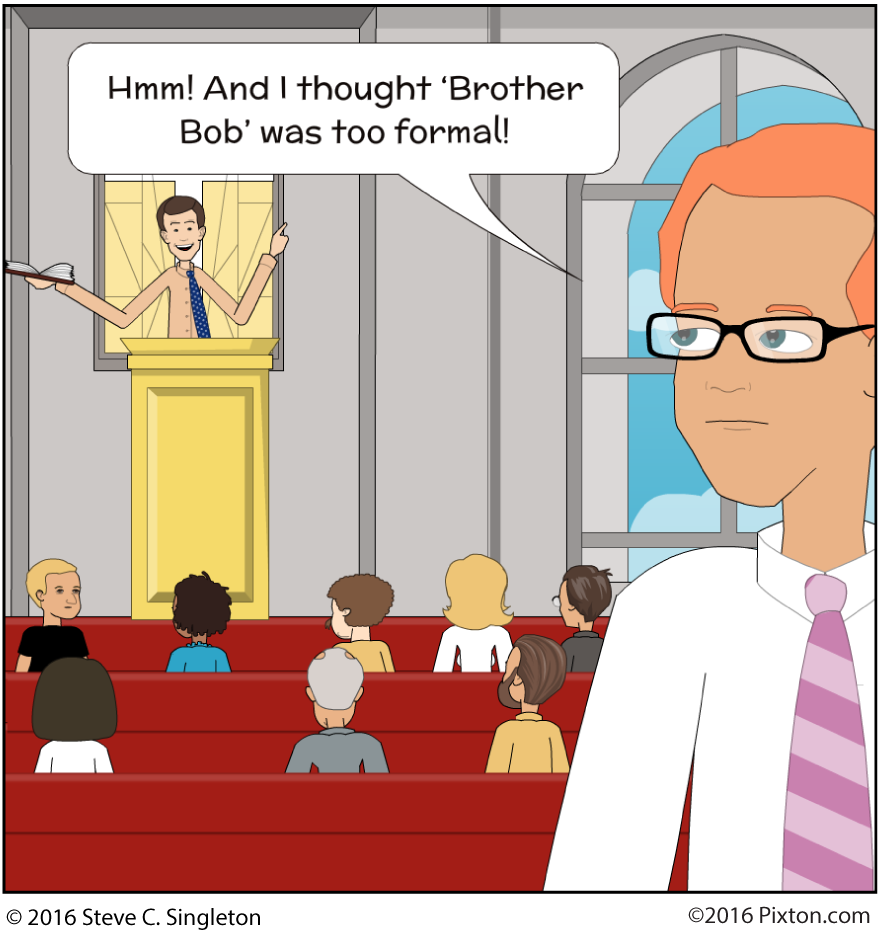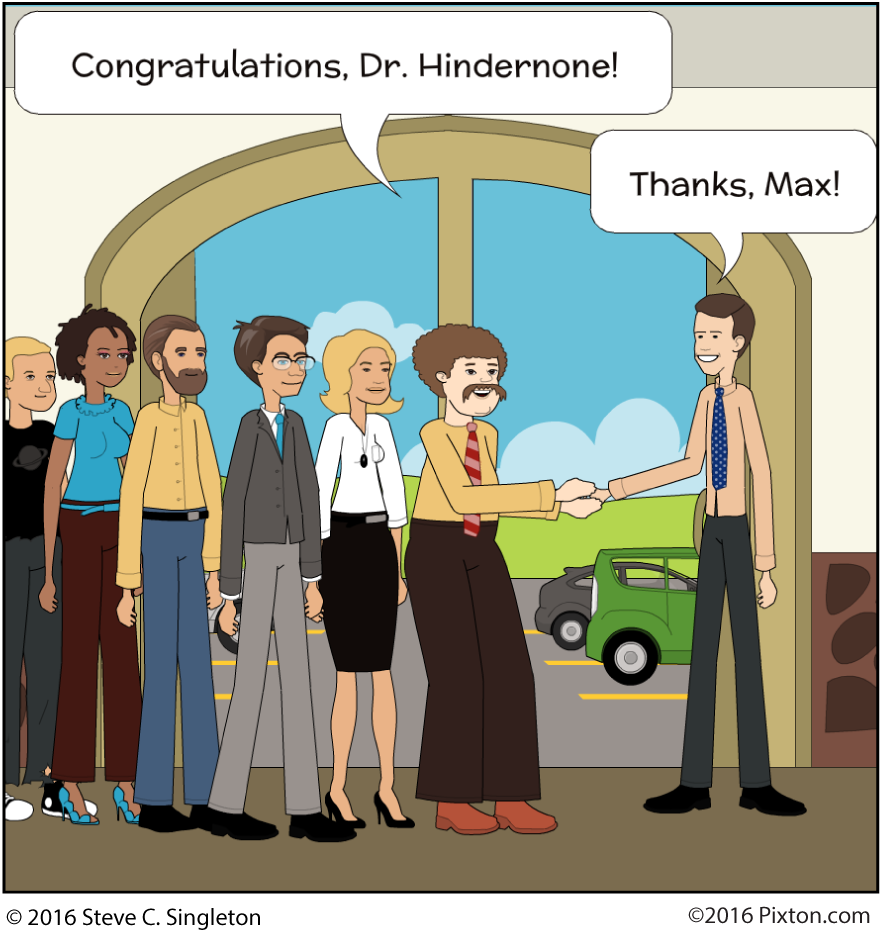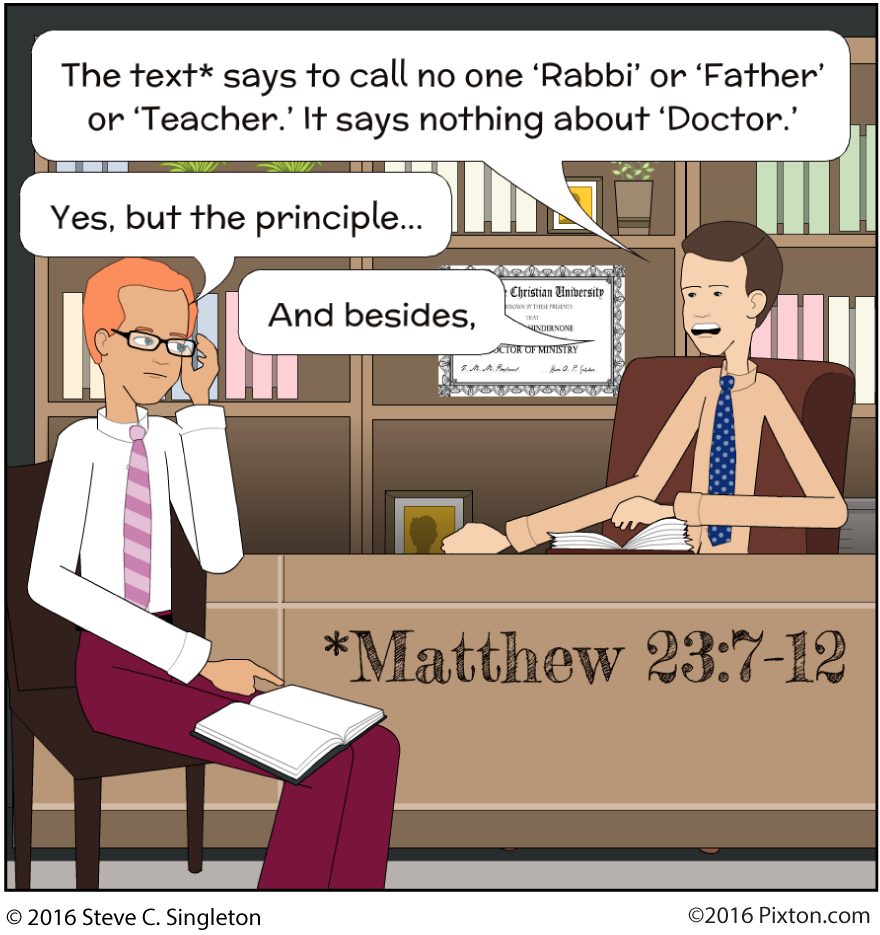Poisonous Righteous Titles: Jesus vs. the Pharisees
“Poisonous Righteous” Titles
Catching a glimpse
I chose the expression ‘poisonous righteous’ for its shock value. The phrase comes from a Moxy Früvous song I heard on the web following Operation Desert Storm (the first Gulf War). The satirical a cappella singers ask the warmongers of government, “How can you be so poisonous righteous?”
To be poisonous righteous is an oxymoron; you can be poisonously wicked or healthfully righteous, but you can’t be half one, half the other. Yet this phrase seems quite appropriate for the scribes and Pharisees that Jesus exposes in a scathing denunciation, recorded in Matthew 23, with parallels in Mark chapter 12 and Luke 20.
Accept my challenge to study the Pharisees carefully, because you may, like I do, catch in them a glimpse of your own reflection. As followers of Jesus, the last thing we would ever want is to be poisonous righteous.
In this post we focus on Matthew 23:7–12:
They love to be greeted with respect in the marketplaces and to be called ‘Rabbi’ by others. But you are not to be called ‘Rabbi,’ for you have one Teacher, and you are all brothers. And do not call anyone on earth ‘father,’ for you have one Father, and he is in heaven. Nor are you to be called instructors, for you have one Instructor, the Messiah. The greatest among you will be your servant. For those who exalt themselves will be humbled, and those who humble themselves will be exalted.
Why do we enjoy praise so much?
If you are involved in Christian ministry in any capacity, you have probably experienced the feeling that very few really appreciate your efforts. Don’t you wish that someone would publicly call for “giving honor where honor is due”? And if you do hear your name called out for public recognition, does a part of you quietly say, “I really do deserve this”?
If a person has labored strenuously over several years to obtain a graduate degree, they may have a yearning for others to appreciate their achievement and verbally give them a little credit. Soon, the letters of the degree may begin to appear after their name in e-mail signatures, on signs, and even in voicemail messages. They have a sense of accomplishment, and they wish others could share in it.
When do such innocent feelings become corrupt self-absorption? Perhaps the answer is different for every individual, but our Master’s warning stands its ground, for spiritual danger is just ahead.
Guarding against self-promotion
In Luke 14:7–11, Jesus presents the similitude of the banquet seating chart, warning us to avoid best places lest the host’s reseating them lower proves an embarrassment. Jesus advises us to choose the lowest place, “For all those who exalt themselves will be humbled, but those who humble themselves will be exalted” (v. 11). The lesson extends far beyond dinner-party etiquette. Jesus is telling us to let others praise us rather than taking on the job ourselves.
Respect and praise are not our goal
The titles ‘Rabbi,’ ‘Father,’ and ‘Teacher’ (or ‘Professor’) endow on the bearer an authority that he or she often doesn’t deserve. Some people will accept what they say without scrutiny and without thinking it through. Even if they speak the truth, their students fail to learn to think for themselves. We must examine the support, wrestle with the reasoning, and sift the evidence if we are to move toward becoming mature Bible students and even teachers. An argument is not right just because Dr. So and So makes it.
The irony of humility
The surprising thing is that the teachers who know the most are often the most humble. This is partly because they are painfully aware of how much they don’t know, partly because they constantly remember all of the mistakes they have made as students, and perhaps partly because they had a mentor who modeled humility for them.
The best teachers are aware that humility is one of the greatest lessons they can teach to their students. It takes humility for a teacher to tell a student, “You are right. I was mistaken.” But the student who hears the teacher admit such a thing will never forget it, and admiration for that teacher will spontaneously spring forth from the student’s heart.
Want to go deeper?
Thomas à Kempis. Imitation of Christ.
Thomas a Kempis was not a haphazard follower of Jesus. The depth of his masterpiece mirrors the life of a man who did whatever was necessary to imitate his own Savior. A Kempis lived as intentionally as he wrote. We must turn away from the things of this world, we must live sacrificially, we must be inundated with Christ’s passionate teaching, and we must pray to be removed from distraction. —From the publisher.
You may even want to purchase a copy or get it as an e-book.
Peter Haas. Pharisectomy: How to Joyfully Remove Your Inner Pharisee, and other Religiously Transmitted Diseases. Crossway, 2012.
With an entertaining blend of social-scientist-meets-sage, Peter Haas provides a penetrating look at our faith that just might reveal our own “hidden Pharisees.” Through a series of autopsies, Haas bypasses the cheap “church-make-over solutions” and cuts straight to our deepest need: a Pharisectomy. —From the publisher.
Celebrate the first anniversary of Go Deeper!
The first year of our cartoon (May 2015 through May 2016) is now available, along with all of the accompanying posts. Get 278 pages, mostly on how to study the Bible, for only $4.95. The cartoon characters will help you learn as you share their silliness and their pain. Learn more and read 25 sample pages.







In verse 27, Jesus mentioned the sixth woe. In this one, He described them as whited sepulchres, graves that had been made beautiful and white on the outside but within were full of dead men’s bones. This illustrated that the Pharisees were outwardly righteous but inwardly full of hypocrisy and iniquity.
Yes, I’m going through the chapter over several weeks. We will get to that part.
a reference to eternal damnation, rather than to Hades, the temporary abode of the wicked in the intermediate state. The Pharisees and their proselytes both would end up in eternal damnation.
In verse 27, Jesus mentioned the sixth woe. In this one, He described them as whited sepulchres, graves that had been made beautiful and white on the outside but within were full of dead men’s bones. This illustrated that the Pharisees were outwardly righteous but inwardly full of hypocrisy and iniquity.
In verse 27, Jesus mentioned the sixth woe. In this one, He described them as whited sepulchres, graves that had been made beautiful and white on the outside but within were full of dead men’s bones. This illustrated that the Pharisees were outwardly righteous but inwardly full of hypocrisy and iniquity.